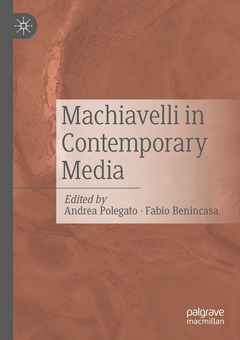Description
Machiavelli in Contemporary Media, 1st ed. 2021
Coordinators: Polegato Andrea, Benincasa Fabio
Language: English
Subject for Machiavelli in Contemporary Media:
Publication date: 07-2022
162 p. · 14.8x21 cm · Paperback
Publication date: 07-2021
162 p. · 14.8x21 cm · Hardback
Description
/li>Contents
/li>Biography
/li>Comment
/li>
There is an undeniable and persisting fascination with Niccolò Machiavelli and his infamous political theories in contemporary pop culture. Many comic books, video games, TV series, movies, and graphic novels make explicit or implicit references to the most infamous political thinker of all-time. By offering the reader an idea of how Machiavelli is present and represented in contemporary media (in particular, in Assassin?s Creed, House of Cards, Homeland, pop art, American and Italian politics, Italian cinema, and Trump?s rise to power), Machiavelli in Contemporary Media gives new life to Machiavellian thought and shows how his theories?but also the several different interpretations of them (Machiavellianism)?are still influential today.
Andrea Polegato is Assistant Professor in Italian Studies at California State University, Fresno, USA. He works on the political language of Niccolò Machiavelli and Florence between the Quattrocento and Cinquecento. His publications include articles on Machiavelli, Pietro Aretino, and the Italian filmmaker Ermanno Olmi. He is also working on a comparison between Renaissance Italy and Ancient China.
Fabio Benincasa is Adjunct Professor for Duquesne University ? Rome Campus and Università Nicola Cusano, Italy. As well as several essays on cinema, he co-edited Come rovesciare il mondo ad arte (2015) with Giorgio de Finis and Andrea Facchi, and with de Finis Nome plurale di città (2016), and Il mondo degli umani si è fermato (2020). He is editor of Frontiere della Psicoanalisi and has collaborated with the Museum of Contemporary Art of Rome.
1. Benincasa and Polegato, Introduction.- 2. Francesco Rosetti, The Iconography of Power: From Machiavelli’s Portraits to the Pop Art.- 3. Simone Bregni, “Unarmed prophets have always been destroyed, whereas armed prophets have succeeded:” Machiavelli’s Portrayal in the Assassin’s Creed Series.- 4.Simone Testa, Why Write a Graphic Novel about Machiavelli?.- 5. Fabio Benincasa, Ghosts of Machiavelli in the Italian Political Cinema.- 6. Giacomo Tagliani, “Invisible Ends Justify Secret Means”: Homeland, Machiavelli, and the Least of All Possible Evils.- 7. Andrea Polegato, House of Cards between Machiavelli and Machiavellianism.- 8. William Landon, Donald Trump, Niccolò Machiavelli, the Establishment and the People: Words of Advice and Warning from The Prince.
Andrea Polegato is Assistant Professor in Italian Studies at California State University, Fresno, USA. He works on the political language of Niccolò Machiavelli and Florence between the Quattrocento and Cinquecento. His publications include articles on Machiavelli, Pietro Aretino, and the Italian filmmaker Ermanno Olmi. He is also working on a comparison between Renaissance Italy and Ancient China.
Fabio Benincasa is Adjunct Professor for Duquesne University – Rome Campus and Università Nicola Cusano, Italy. As well as writing several essays on cinema, he has co-edited Exploit. Come rovesciare il mondo ad arte (2015) with Giorgio de Finis and Andrea Facchi, and with de Finis Rome. Nome plurale di città (2016), and Closed. Il mondo degli umani si è fermato (2020). He is editor of Frontiere della Psicoanalisi and has collaborated with the Museum of Contemporary Art of Rome.
Gives new life to Machiavelli’s thought by exploring the influence of his ideas on contemporary American politics and popular culture
Examines an undeniable and persistent fascination with Machiavelli in almost all fields of popular media
Explores how Machiavelli can still guide us through contemporary issues and themes, such as the rise to power of Donald Trump, the War on Terror, and self-representations of power

